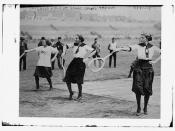Since the creation of man, sports have had a tremendous role in the way people live their lives. From the time we are born, until our elderly age, most of us are involved in some way with sports. Whether it is a scrimmage game of soccer at recess in elementary school, playing on the varsity athletic team or simply watching the Olympics or sporting events on television, sports have an influential role in our everyday lives. The outstanding popularity of the sports industry has profoundly affected youth sports organizations that an estimated twenty-six million children ages six through eighteen participate in at least one school or community based athletic program (Smith & Smoll, 1997). Well structured sport programs can provide youths with opportunities to participate in activities that have immediate and long term benefits, both psychologically, physically, and socially (Willox, 1994).
A large psychological benefit of sport participation is that sports can boost the self esteem of the people participating.
The self-esteem of children is boosted when parents, coaches, and other teammates give the child positive feedback and show a sense of pride in what the child has accomplished (Bilich, 2006). Numerous studies have shown that girls who participate in physical activity such as sports are more likely to have more positive feelings of self-worth/self-esteem and a more positive body image than girls who are not very physically active in sports (USA Football, 2006). This feedback is also important because it encourages young competitors to view success as achieving their own realistic goals, rather than depending on winning as the main reason for success. This psychological benefit of self esteem in many cases goes along with academic performance. A study conducted by Hardiness Research of Wyoming found that by a 2:1 ratio for boys and a 3:1 ratio...


